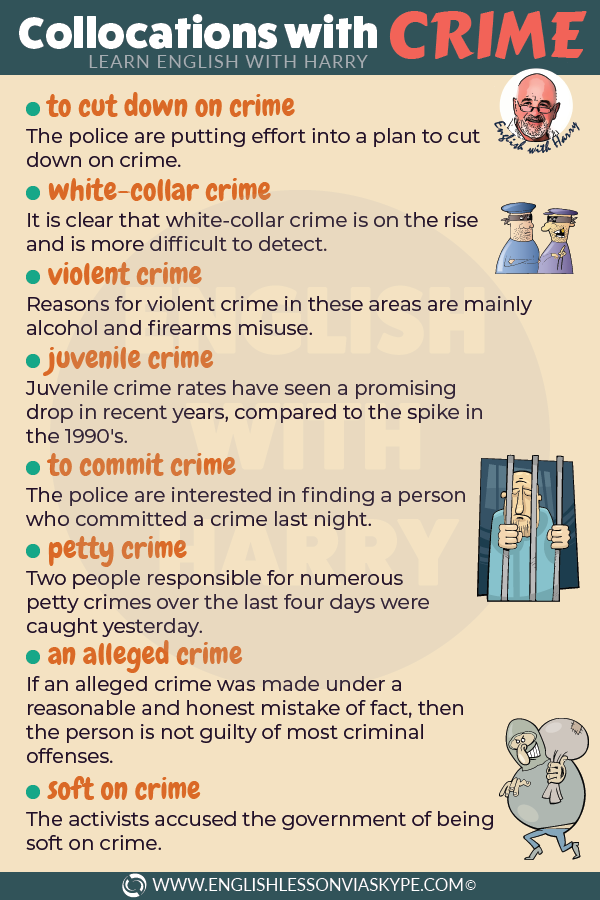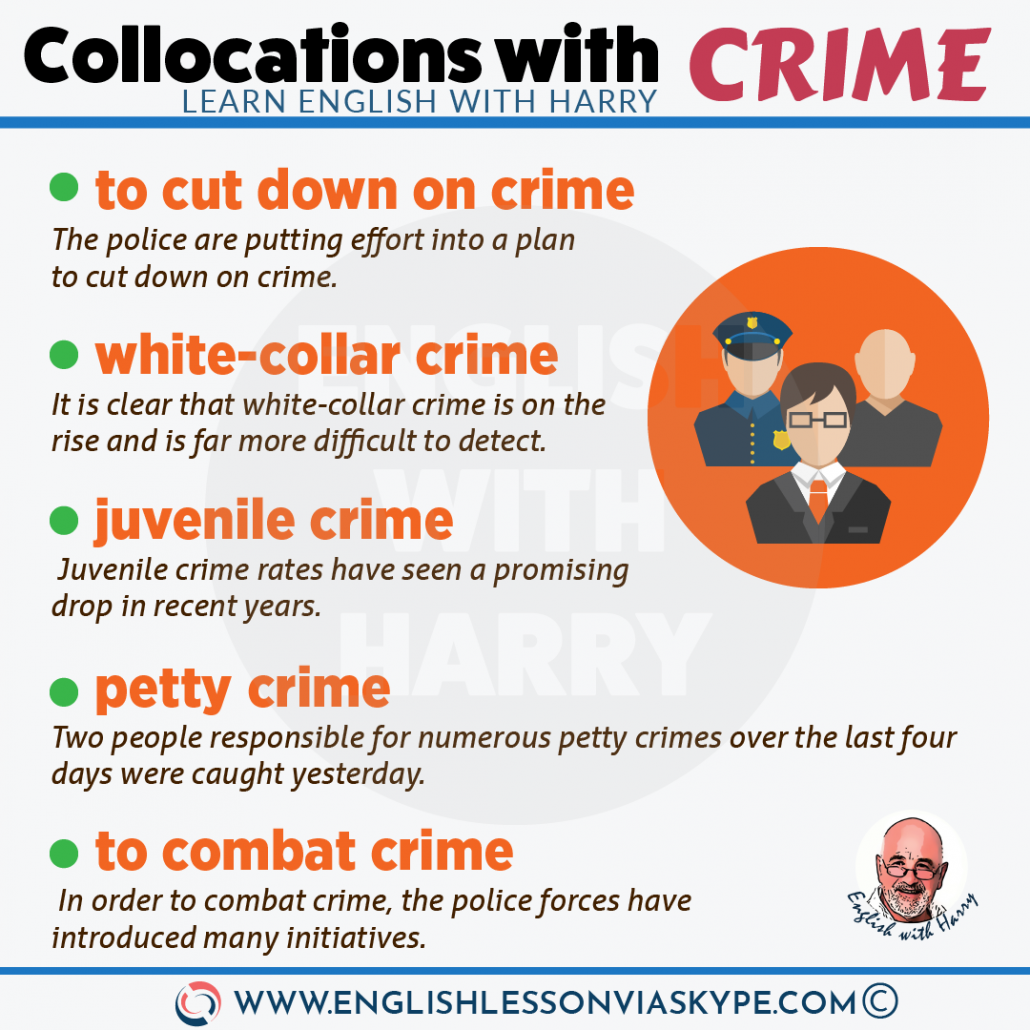Here we’re going to look at 10 collocations with crime. What English expressions can we use when people commit a crime?
You will learn the meanings of English collocations:
cut down on crime, white-collar crime, violent, juvenile crime, to commit a crime, to combat crime, to turn to crime, alleged crime, and petty crime, and I’ll give you some examples.
To complete your vocabulary on crime and punishment, you also need to learn crime and punishment vocabulary.
Speak Better English with Harry - Episode 113
list of collocations with Crime
Harry
English Collocations with Crime

to cut down on crime
Meaning: When we cut down on crime, we want to reduce the rate of crime.
Example:
The police are putting effort into a plan to cut down on crime.
Meaning to reduce the rate of crime.
That might be to reduce the rate of crime or to cut down on crime in particular arrears, locations – in the city centre, or in the suburbs – or it might cut down on particular types of crimes serious crime, or other smaller crimes like house burglaries or car thefts or – as we have a lot of problems in London at the moment – knife crime.
So the police are putting in plans or actions plans where they will try to cut down on different types of crimes.
Intermediate to Advanced English Marathon

INSANITY: doing the same thing over and over again and expecting different results.
Albert Einstein
- What you'll learn:
- better understanding of more complex grammar structures
- advanced English vocabulary words
- British & American slang
- perfect your listening skills through practing different accents
- This marathon is for you if you're:
- stuck at an intermediate English level
- tired of confusing explanations
- a mature student
- shy & introverted
white-collar crime
Meaning: White-collar C-O-L-L-A-R is the colour of the shirt, or white-collar shirt, which usually indicates management. White-collar crime is a collocation to describe the financial crime, typically committed by a business person or public official. When somebody might take money from a company, or somebody might embezzle money and take it without people’s knowledge.
Example:
It is also clear that white-collar crime is on the rise and, for various reasons, is far more difficult to detect.
They might, as they do now, take money from people’s accounts through some type of phishing or trying to get people’s account details and fraudulently take the money and transfer it to their own accounts. So this is referred to as white-collar crime.
Nobody gets physically hurt with white-collar crime but people can lose a lot of money – bad advice, bogus investments, and other issues related to that topic of white-collar crime.
violent crime
Meaning: this is a type of crime with violence; a crime when somebody is physically hurt. For example, if you’re attacked in the street, pushed to the ground, or you’ve beaten up.
Example:
Reasons for violent crime in these areas are mainly alcohol and firearms misuse combined with youth unemployment.
There are also other violent crimes, of course, which could be somebody attacking their partner or their children, and these could also be regarded as violent crimes. Violent crimes can take place after a football match where groups of fans from one team attack the individuals, or an individual, from the other team, and these attacks could be with violence or regarded as violent crime.
juvenile crime
Meaning: the juvenile crime is the crime committed by young people; these are young people committing certain types of crime. These types of crime may not be so serious. For example, they could be spraying graffiti on bus stops, or people’s doors, or things like that.
Example:
Juvenile crime rates have seen a promising drop in recent years, compared to the spike in the 1990s.
There could be a juvenile crime of shoplifting. When they go to a store, and they take some products without paying for it, obviously, but also without knowing what they’re doing. It might be a game to them, but it’s quite a serious situation, so it’s regarded as an act of juvenile crime. And for juvenile crimes usually, the courts have lesser sentences. It might be a warning or some type of misconduct warning, but they usually don’t go to prison, unless somebody is a repeat offender, meaning they do it time and time again.
English Collocations with Crime

Share and help other students to improve English skills
to commit crime
Meaning: to commit means to carry out, or simply to do.
Example:
The police are interested in finding a person who committed a crime last night.
Or they’re trying to encourage young people to take up some sports or other activities, they don’t get encouraged by other people to commit crimes.
So to commit is the act of doing, the act of carrying out that particular crime.
to combat crime
to tackle crime
Meaning: again, as we’re talking about crime, obviously, a lot of references to police, and police forces, and government actions and laws, so these come together to try to combat crime. Meaning, to reduce the crime rate.
Examples:
In order to combat crime, the police forces have introduced many initiatives.
The government has announced an increase in police on the streets in an effort to combat/tackle an increase in crime rates.
Everything is done to combat or tackle crime.
English Collocations with Crime
to turn to crime
Meaning: we use this collocation when we’re referring to something that people might be encouraged to do or something they might decide to do out of boredom, out pressure from a peer group. To turn to crime means to start doing some criminal activities. Initially small crimes, they lead to bigger and more serious crimes.
Example:
The boy turned to crime because he had no parental supervision.
Those children without strong parental supervision are more likely to turn to crime than those children who do.
Those children who have a lot of sports or extra-curriculum activities at school are less likely to turn to crime in the future.
alleged crime
Meaning: a crime that is not proven; it is understood that something happened but we have yet to prove it.
Example:
The alleged burglar was seen entering the building.
They someone entering the building, they are not sure if it was the man they’re now looking for, and hence, until they prove it, they refer to him as an alleged burglar, or, in this case, we refer to an alleged crime. Was it a crime in fact? It could have been a mistake, a mistake in identity.
Until it’s proven, it’s not a real crime, but it is an alleged crime. Meaning, they believe it is a crime, or it’s understood to have been a crime.
speak better English with Harry - Episode 114
petty crime
Meaning: small or insignificant or not so serious crime. And petty crime often can be described as things like shoplifting by young kids, spraying graffiti at bus shelters, taking apples from somebody’s apple orchard, or something like that. These would all be petty crimes, usually, they don’t carry huge punishment.
Example:
Two people responsible for numerous petty crimes over the last four days were caught yesterday.
So petty crime – something small, minor, insignificant, something not so important.
There you have the collocations related to crime. Listen to my English learning podcast Speak Better English with Harry on iTunes, Stitcher and Spotify.
More Information
For more information on English idioms, English phrasal verbs and English grammar, click on the links below:
Difference between ORDINARY, NORMAL and USUAL
You will love these English lessons

10 Ways to Say Important in English
Here you will learn 10 ways to say important in English. Great explanations and detailed examples will help you boost your vocabulary. A2/B1 English level.
Commonly Confused Homophones in English
Have you ever looked at some English words that are spelled differently pronounced the same but have different meanings? These


Phrasal Verbs about Crime and Scam
Here you will learn phrasal verbs about crime and scam. We have already reviewed crime and punishment vocabulary, English idioms